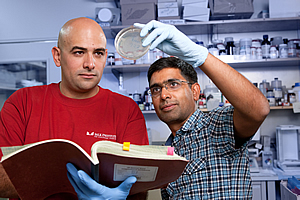The human body has a so-called alarm clock gene that wakes up even if one hasn’t set the bedside alarm, U.S. researchers say.
Researchers at the Salk Institute for Biological Studies in La Jolla, Calif., said they identified a new component of the biological clock, a gene responsible for starting the clock from its restful state every morning.
 |
| Luciano DiTacchio and Satchidananda Panda (Courtesy of Salk Institute for Biological Studies) |
The biological clock ramps up our metabolism early each day, initiating important physiological functions that tell our bodies that it’s time to rise and shine.
Discovery of this new gene and the mechanism by which it starts the clock everyday may help explain the genetic underpinnings of sleeplessness, aging and chronic illnesses, such as cancer and diabetes, and could eventually lead to new therapies for these illnesses.
“The body is essentially a collection of clocks,” says Satchidananda Panda, an associate professor in Salk’s Regulatory Biology Laboratory, who led the research along with Luciano DiTacchio, a post-doctoral research associate.
“We roughly knew what mechanism told the clock to wind down at night, but we didn’t know what activated us again in the morning. Now that we’ve found it, we can explore more deeply how our biological clocks malfunction as we get older and develop chronic illness.”
In a report published in the journal Science, the Salk researchers and their collaborators at McGill University and Albert Einstein College of Medicine describe how the gene KDM5A encodes a protein, JARID1a, that serves as an activation switch in the biochemical circuit that maintains our circadian rhythm.
“Now that we’ve found it, we can explore more deeply how our biological clocks malfunction as we get older and develop chronic illness. “So much of what it means to be healthy and youthful comes down to a good night’s sleep,” Panda said.
http://www.koreaherald.com/national/Detail.jsp?newsMLId=20110930000498
No comments:
Post a Comment